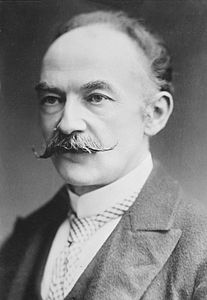Analysis of Faintheart In A Railway Train
Thomas Hardy 1840 (Stinsford) – 1928 (Dorchester, Dorset)
At nine in the morning there passed a church,
At ten there passed me by the sea,
At twelve a town of smoke and smirch,
At two a forest of oak and birch,
And then, on a platform, she:
A radiant stranger, who saw not me.
I queried, 'Get out to her do I dare?'
But I kept my seat in my search for a plea,
And the wheels moved on. O could it but be
That I had alighted there!
| Scheme | ABAAB BCBBC |
|---|---|
| Poetic Form | Etheree (40%) |
| Metre | 1100101101 11111101 11011101 110101101 011011 0100101111 1101110111 11111011101 0011111111 11111 |
| Closest metre | Iambic pentameter |
| Characters | 370 |
| Words | 84 |
| Sentences | 5 |
| Stanzas | 2 |
| Stanza Lengths | 5, 5 |
| Lines Amount | 10 |
| Letters per line (avg) | 28 |
| Words per line (avg) | 8 |
| Letters per stanza (avg) | 138 |
| Words per stanza (avg) | 41 |
Font size:
Submitted on May 13, 2011
Modified on April 29, 2023
- 24 sec read
- 594 Views
Citation
Use the citation below to add this poem analysis to your bibliography:
Style:MLAChicagoAPA
"Faintheart In A Railway Train" Poetry.com. STANDS4 LLC, 2024. Web. 29 Apr. 2024. <https://www.poetry.com/poem-analysis/36366/faintheart-in-a-railway-train>.


Discuss this Thomas Hardy poem analysis with the community:
Report Comment
We're doing our best to make sure our content is useful, accurate and safe.
If by any chance you spot an inappropriate comment while navigating through our website please use this form to let us know, and we'll take care of it shortly.
Attachment
You need to be logged in to favorite.
Log In